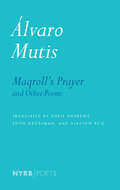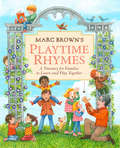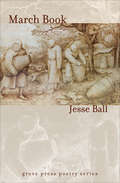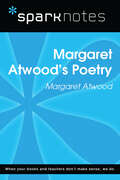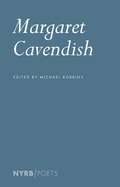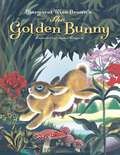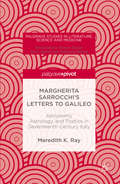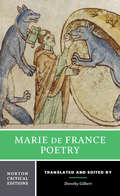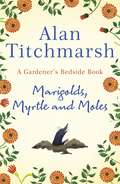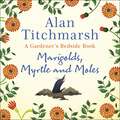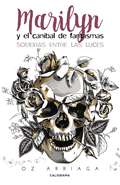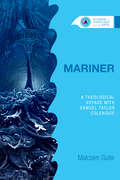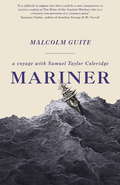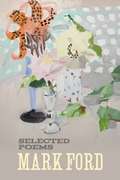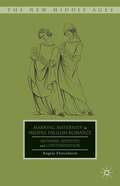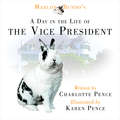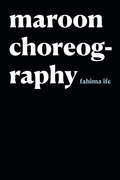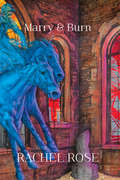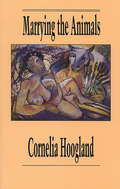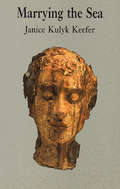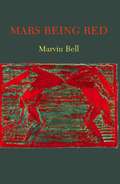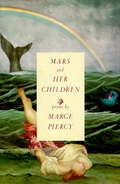- Table View
- List View
Maqroll's Prayer and Other Poems
by Alvaro MutisÁlvaro Mutis&’s fantastical, gripping, unnerving tales of the exploits and adventures of Maqroll, the Gaviero, or watchman, an inveterate wanderer both on land and sea, are among the most beloved works of twentieth-century Latin American fiction. Like the stories of Borges, like the novels of Mutis&’s great friend García Márquez, they conjure a strange world of their own which also holds up a mirror, disquieting and revelatory, to the everyday world we imagine we know. If Maqroll eventually found his way into prose, he began his career in poetry, and it was as a poet that Mutis first made his name as a writer. This selection of Mutis&’s haunting verse, with its evocations, now lush, now stark, of the landscapes of South America, with its prayers to an unknown god, is the first to be published in English. Rendered by Chris Andrews, Edith Grossman, and Alastair Reid, masters of the art of translation, these resonant poems offer a dazzling new entry into the imagination of one of the most original and memorable writers of modern times.
Marc Brown's Playtime Rhymes: A Treasury for Families to Learn and Play Together
by Marc BrownFingers ready?Fingers set?Fingers play!It's time for Playtime Rhymes-a treasury of twenty favorite finger rhymes compiled and illustrated by the bestselling and beloved artist Marc Brown for the enjoyment of young and old. From the clever Whoops! Johnny and funny Do Your Ears Hang Low? to the irrepressible Itsy-Bitsy Spider and rousing Wheels on the Bus, these are rhymes to say and sing aloud, each with pictorial instructions for the correlating finger movements.An interactive experience at its very best, Playtime Rhymes will get little hands wiggling, jiggling, pointing, pounding, bending, stretching, and dancing as children animate the rhymes, pore over the vibrant pictures, and share the fun with family and friends.
March Book (Grove Press Poetry Ser.)
by Jesse BallMarch Book is a wonder and a revelation. A shockingly assured first collection from young poet Jesse Ball, its elegant lines and penetrating voice present a poetic symphony instead of a simple succession of individual, barely-linked poems. Craftsmanship defines this collection; it is full of perfect line-breaks, tenderly selected words, and inventive pairings. Just as impressive is the breadth and ingenuity of its recurring themes, which crescendo as Ball leads us through his fantastic world, quietly opening doors. In five separate sections we meet beekeepers and parsons, a young woman named Anna in a thin, linen dress and an old scribe transferring the eponymous March Book. We witness a Willy Loman-esque worker who ran out in the noon street / shirt sleeves rolled, and hurried after / that which might have passed only to be told that there's nothing between him and the suddenness of age. While these images achingly inform us of our delicate place in the physical world, others remind us why we still yearn to awake in it every day and make pillows with the down / of stolen geese, build / rooms in terms of the hours of the day. Like a patient Virgil, insistent and confident, Ball escorts us through his mind, and we're lucky to follow.
Margaret Atwood's Poetry (SparkNotes Literature Guide Series)
by SparkNotesMargaret Atwood's Poetry (SparkNotes Literature Guide) by Margaret Atwood Making the reading experience fun! Created by Harvard students for students everywhere, SparkNotes is a new breed of study guide: smarter, better, faster. Geared to what today's students need to know, SparkNotes provides: *Chapter-by-chapter analysis *Explanations of key themes, motifs, and symbols *A review quiz and essay topicsLively and accessible, these guides are perfect for late-night studying and writing papers
Margaret Cavendish: Observations Upon Experimental Philosophy (Cambridge Texts In The History Of Philosophy Ser.)
by Margaret CavendishAn eclectic collection of poetry by one of 17th century England's boldest, smartest, and independent women.Margaret Cavendish, the Duchess of Newcastle-upon-Tyne, was a groundbreaking writer—a utopian visionary, a scientist, a science-fiction pioneer. She moved in philosophical circles that included Thomas Hobbes and René Descartes, and she produced startlingly modern poems unlike anything published in the seventeenth century or since, at once scientific and visionary, full of feminist passion and deep sympathy with the nonhuman world. In recent years, Cavendish has found many new admirers, and this selection of her verse by Michael Robbins is an ideal introduction to her singular poetic world.
Margaret Wise Brown's The Golden Bunny
by Margaret Wise BrownA beautiful gift edition of Margaret Wise Brown's classic! This wonderful collection of bunny stories and poems, by the author of Goodnight Moon, has been reissued for a new generation in a beautiful hardcover edition. Margaret Wise Brown&’s witty writing, featuring bunnies in all seasons, is brought to life with lush, ornamental paintings by Caldecott Medalist Leonard Weisgard. This deluxe picture book will be a special Easter gift for a child, or any fan of Margaret Wise Brown and Leonard Weisgard.
Margherita Sarrocchi's Letters to Galileo: Astronomy, Astrology, and Poetics in Seventeenth-Century Italy (Palgrave Studies in Literature, Science and Medicine)
by Meredith K. RayThis book examines a pivotal moment in the history of science and women’s place in it. Meredith Ray offers the first in-depth study and complete English translation of the fascinating correspondence between Margherita Sarrocchi (1560-1617), a natural philosopher and author of the epic poem, Scanderbeide (1623), and famed astronomer, Galileo Galilei. Their correspondence, undertaken soon after the publication of Galileo’s Sidereus Nuncius, reveals how Sarrocchi approached Galileo for his help revising her epic poem, offering, in return, her endorsement of his recent telescopic discoveries. Situated against the vibrant and often contentious backdrop of early modern intellectual and academic culture, their letters illustrate, in miniature, that the Scientific Revolution was, in fact, the product of a long evolution with roots in the deep connections between literary and scientific exchanges.
Marie de France Poetry
by Dorothy GilbertHonorable Mention for the 2015 Modern Language Association's Aldo and Jeanne Scaglione Prize For Translation of a Literary WorkMarie de France was a medieval poet who was probably born in France and who lived in England during the twelfth century. Prominent among the earliest poets writing in the French vernacular, Marie de France helped shape the style and genres of later medieval poetry. This Norton Critical Edition includes all of Marie's lais (short narrative verse poems); selected fables; and a generous excerpt from Saint Patrick's Purgatory, a long poem based on a well-known medieval legend. Each text is accompanied by detailed explanatory annotations. For comparative reading, two lais, "Bisclavret" and "Y#65533;nec," are accompanied by Marie's facing-page originals. "Backgrounds and Contexts" is thematically organized to provide readers with a clear sense of Marie's inspirations. Topics include "The Supernatural," "Love and Romance," "Medical Traditions," "Fable Sources and Analogues: Similar Themes," and "Purgatory and the Afterlife. " Ovid, Chaucer, Andreas Capellanus, Boccaccio, Aristotle, and Bede are among the authors included. From the wealth of scholarly work published on Marie de France, Dorothy Gilbert has chosen excerpts from nine pieces that address issues of history and authorship as well as major themes in the lais, fables, and Saint Patrick's Purgatory. The contributors are Thomas Warton, Abb#65533; Gervais de la Rue, Joseph Bedier, Leo Spitzer, R. Howard Bloch, E. A. Francis, Jill Mann, and Jacques Le Goff. A selected bibliography is also included.
Marigolds, Myrtle and Moles: A Gardener's Bedside Book - the perfect book for gardening self-isolators
by Alan Titchmarsh'Charming miscellany of rhymes and reflections celebrating the garden'CHOICE***The perfect bedside book for the green-fingered - hilarious and touching poems on a gardening theme written and introduced by the nation's favourite gardener and presenter of ITV's Grow Your Own At Home and Love Your Garden, Channel 5's Secrets of the National Trust and with his own show on Classic FM.From touching poems on the peony, the snowdrop and the sweet pea to hilarious verse on Emily the Gardener and the Garden Design Course, this is Alan Titchmarsh's heartfelt and entertaining celebration of his favourite space - the garden.
Marigolds, Myrtle and Moles: A Gardener's Bedside Book - the perfect book for gardening self-isolators
by Alan Titchmarsh'Charming miscellany of rhymes and reflections celebrating the garden'CHOICE***The perfect bedside book for the green-fingered - hilarious and touching poems on a gardening theme written and introduced by the nation's favourite gardener and presenter of ITV's Grow Your Own At Home and Love Your Garden, Channel 5's Secrets of the National Trust and with his own show on Classic FM.From touching poems on the peony, the snowdrop and the sweet pea to hilarious verse on Emily the Gardener and the Garden Design Course, this is Alan Titchmarsh's heartfelt and entertaining celebration of his favourite space - the garden.
Marigolds, Myrtle and Moles: A Gardener's Bedside Book - the perfect book for gardening self-isolators
by Alan TitchmarshThe perfect listen for the green-fingered - hilarious and touching poems on a gardening theme written and introduced by the nation's favourite gardener and presenter of ITV's Love Your Garden, Channel 5's Secrets of the National Trust and with his own show on Classic FM.From touching poems on the peony, the snowdrop and the sweet pea to hilarious verse on Emily the Gardener and the Garden Design Course, this is Alan Titchmarsh's heartfelt and entertaining celebration of his favourite space - the garden.(P) 2020 Hodder & Stoughton Ltd
Marilyn y el caníbal de fantasmas: Sombras entre las luces
by Oz ArriagaUn libro que desearás llevar en el bolsillo, en el corazón, en la dignidad y en el alma. <P><P>Marilyn y el caníbal de fantasmas. Sombras entre las luces es un compendio poético de un artista de nombre desconocido, cuya historia es narrada en la precuela de Macrame. <P><P>Cada acción poética está reflejada en un color distinto y existente de la naturaleza, contenidas en unos pequeños cristales de forma cardíaca que portan en su interior textos apreciables que pueden ser visualizados solo si se exponen dichas turmalinas a los últimos rayos de sol en un atardecer, contemplándose en aquel misterioso cristal un efecto visual impresionante con un universo de emociones y frases que harán estremecer tus sentidos. <P><P>Su mensaje está escrito en lenguaje espiritual, lo que significa que puede ser entendido por cualquier persona, de cualquier edad y tiempo, por almas gemelas y solitarias, vivos o muertos, nacidos y no nacidos, pues aquel es el «Idioma de las luces». <P>La fuente de aquellas notas emocionales han sido los sentimientos de aprecio, decepción, reflexiones sobre la vida y la muerte, conmiseración y alegría, amor y odio, así como la locura y trascendencia que se ondulan con la brisa suave que fluye frente al mar.
Mariner: A Theological Voyage with Samuel Taylor Coleridge (Studies in Theology and the Arts)
by Malcolm GuiteInstead of the cross, the Albatross About my neck was hung.
Mariner: A Voyage with Samuel Taylor Coleridge
by Reverend Dr Malcolm Guite'The story of Coleridge's life does undoubtedly echo that of his poem; this is a book that provides rewarding rereadings of both' - The Sunday TimesA new biography of Samuel Taylor Coleridge, shaped and structured around the story he himself tells in his most famous poem, 'The Rime of the Ancient Mariner'. Though the 'Mariner' was written in 1797 when Coleridge was only twenty-five, it was an astonishingly prescient poem. As Coleridge himself came to realise much later, this tale - of a journey that starts in high hopes and good spirits, but leads to a profound encounter with human fallibility, darkness, alienation, loneliness and dread, before coming home to a renewal of faith and vocation - was to be the shape of his own life. In this rich new biography, academic, priest and poet Malcolm Guite draws out how with an uncanny clarity, image after image and event after event in the poem became emblems of what Coleridge was later to suffer and discover. Of course 'The Rime of the Ancient Mariner' is more than just an individual's story: it is also a profound exploration of the human condition and, as Coleridge says in his gloss, our 'loneliness and fixedness'. But the poem also offers hope, release, and recovery; and Guite also draws out the continuing relevance of Coleridge's life and writing to our own time.'Forcefully and convincingly argued' - The Telegraph
Mariner: A Voyage with Samuel Taylor Coleridge
by Reverend Dr Malcolm Guite'The story of Coleridge's life does undoubtedly echo that of his poem; this is a book that provides rewarding rereadings of both' - The Sunday TimesA new biography of Samuel Taylor Coleridge, shaped and structured around the story he himself tells in his most famous poem, 'The Rime of the Ancient Mariner'. Though the 'Mariner' was written in 1797 when Coleridge was only twenty-five, it was an astonishingly prescient poem. As Coleridge himself came to realise much later, this tale - of a journey that starts in high hopes and good spirits, but leads to a profound encounter with human fallibility, darkness, alienation, loneliness and dread, before coming home to a renewal of faith and vocation - was to be the shape of his own life. In this rich new biography, academic, priest and poet Malcolm Guite draws out how with an uncanny clarity, image after image and event after event in the poem became emblems of what Coleridge was later to suffer and discover. Of course 'The Rime of the Ancient Mariner' is more than just an individual's story: it is also a profound exploration of the human condition and, as Coleridge says in his gloss, our 'loneliness and fixedness'. But the poem also offers hope, release, and recovery; and Guite also draws out the continuing relevance of Coleridge's life and writing to our own time.'Forcefully and convincingly argued' - The Telegraph
Mark Ford: Selected Poems
by Mark FordSelected Poems charts Mark Ford's growing complexity as a writer and his mastery and use of form. John Ashbery calls Ford's work "refreshing" and it's that exuberance and goodwill that animates the poems, giving them their spontaneity and leavening the grim with comic élan and joy. Myth, history, and the everyday are all at play in this wonderfully diverse collection.Invisible Assets:After he threw he through aplate glass window, nature seemed that much closer.Even the dastardly division in societymight be healed by a first-rate glazier.Of course, on Sundays families still picnickedboldly on the village green, and afterwardsmarveled at the blacksmith's glowing forge--how strong they all were in those days!And yet how small! Even a man only six foot tallwas then esteemed a veritable giant.Surely the current furor over architecturewould have evoked from them only pitying smiles.Meanwhile the market for landscapes has neverbeen firmer. This view, for instance, includesseven counties, and a bull charging around in its paddock.Mark Ford was born in Nairobi, Kenya, in 1962. He has published three collections of poetry and a biography of the French writer Raymond Roussel and is the editor of Frank O'Hara's Selected Poems. He has also translated Roussel's New Impressions of Africa and is the editor of London: A History in Verse. He lives in London, England.
Marking Maternity In Middle English Romance
by Angela FlorschuetzWorking at the intersection of medical, theological, cultural, and literary studies, this book offers an innovative approach to understanding maternity, genealogy and social identity as they are represented in popular literature in late-medieval England.
Marlon Bundo: A Day in the Life of the Vice President
by Charlotte PenceThis book depicts a day in the life of the Vice President as seen through the eyes of the pet bunny.
Maroon Choreography (Black Outdoors: Innovations in the Poetics of Study)
by fahima ifeIn Maroon Choreography fahima ife speculates on the long (im)material, ecological, and aesthetic afterlives of black fugitivity. In three long-form poems and a lyrical essay, they examine black fugitivity as an ongoing phenomenon we know little about beyond what history tells us. As both poet and scholar, ife unsettles the history and idea of black fugitivity, troubling senses of historic knowing while moving inside the continuing afterlives of those people who disappeared themselves into rural spaces beyond the reach of slavery. At the same time, they interrogate how writing itself can be a fugitive practice and a means to find a way out of ongoing containment, indebtedness, surveillance, and ecological ruin. Offering a philosophical performance in black study, ife prompts us to consider how we—in our study, in our mutual refusal, in our belatedness, in our habitual assemblage—linger beside the unknown.Duke University Press Scholars of Color First Book Award recipient
Marry & Burn
by Rachel RoseThe fourth collection from award-winning poet Rachel Rose, Marry & Burn is a journey through a troubled relationship and a troubled city, charting the territory of love and addiction, and the stories we tell ourselves about ourselves. Inspired by struggles both personal and global, these are not gentle poems-they probe deep into comforting personal and cultural myths, rending them to pieces even as they expose the beauty in the bright shards that remain. Although the language of blazing passion resonates throughout the discussion of love, longing and addiction, the driving rhythms often resemble more closely the relentless pounding of the ocean: "The sky's cauldron / tips a black storm to swarm the harried / hawk, call, Shame! Shame! Dawn has come / in flame." The golden glow of the ancient world, the dark sweetness of fairy tales, overlay these harsh contemporary moments of rape and addiction, loneliness and poverty, casting them in the richer light of another era. The pain of letting go, whether of love, old habits or cherished personal myths, permeates the collection. But these poems insist that once the dike has broken, once the myths have crumbled, the possibility emerges of building something new.
Marrying the Animals
by Cornelia HooglandNear the centre of Marrying the Animals, Cornelia Hoogland's new book of poetry, is the sequence "In the Meantime: Elizabeth Smart Poems" Hoogland's exploration of Smart's obsession with the poet George Barker is an apt heart for this volume, for its abiding spirit is passion. With feather touch and "kelp green longing," Hoogland pauses over the minutiae of the daily, of the loved. Her lyric intensity embraces family, friends, lovers and literature. Yet she never ignores the untameable passion that circumscribes both love and language, and shades the familiar into wilderness.
Marrying the Sea: Selected Poems
by Janice Kulyk KeeferWinner of the 1999 CAA Canadian Authors Association Award for Poetry and shortlisted for the 1999 Pat Lowther Award Fantasies and meditations on friendship and on love: erotic, romantic, tormented, spurned, married, illicit, patriarchal, filial, professional, and shot-gun. On the love of men and women, and of women for women: as friends, as mothers, as daughters, as uncertain selves; intimate communion with women living, with their imagined pasts, and with the dead. Acclaimed author of Rest Harrow and The Green Library, Janice Kulyk Keefer brings her passionate intelligencs to bear on the beauties and perplexities of these most perennial of human obsessions. The poems are notable for their alert, musical line as much as for their range and sophistication.
Mars Being Red
by Marvin Bell"Marvin Bell has the largest heart since Walt Whitman."--Harvard ReviewIn a recent interview Marvin Bell said, "I've been trying for thirty years to figure out how best to put the news into poems--what other people would call politics. But there are some hairy aesthetic questions connected to overtly political poems." Mars Being Red is the most political book of Bell's storied career--and one of his most beautiful. Infuriated by our country's military aggression and destructive politics, Bell asks, What shall we do, we who are at war but are asked / to pretend we are not? What Bell has done is craft a book of urgency and insight, anger and action: . . . I am, like you, a witness to the coffins that were Viet Nam and Iraq, to a political machine that came up three lemons . . . I am the big ears and the wide eyes to whom time happened. I lived in stormy weather writing songs of love because, tell me if you know, who can help it? Marvin Bell served on the faculty at the Iowa Writers' Workshop for over thirty years. He is the first and current poet laureate of Iowa.
Mars and Her Children
by Marge PiercyA major new collection of poems about women's lives and the closing circle of nature, from a bestselling poet. These poems celebrate the beauties of nature and the eternal cycle of love, death and birth that is being interrupted by the assault on the environment.
